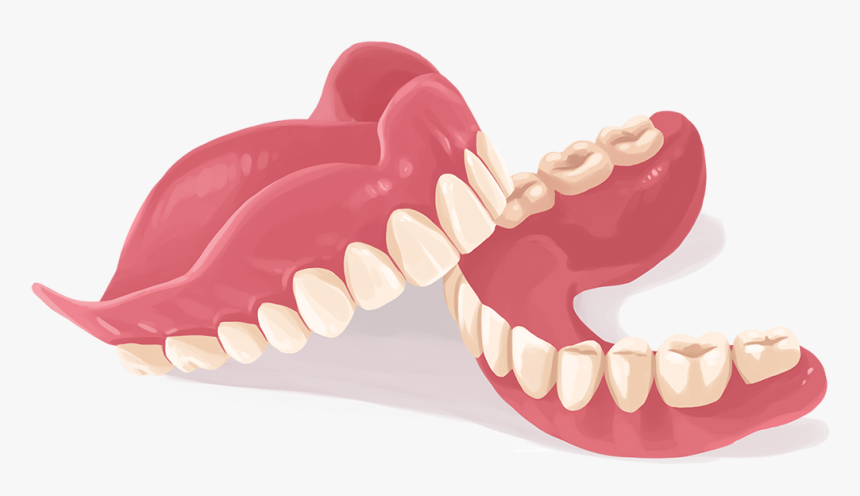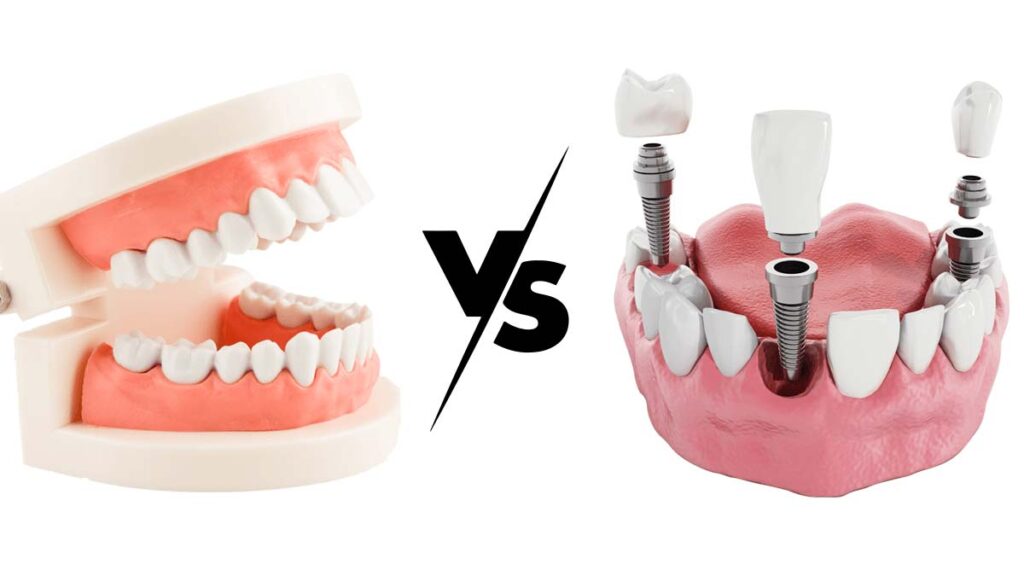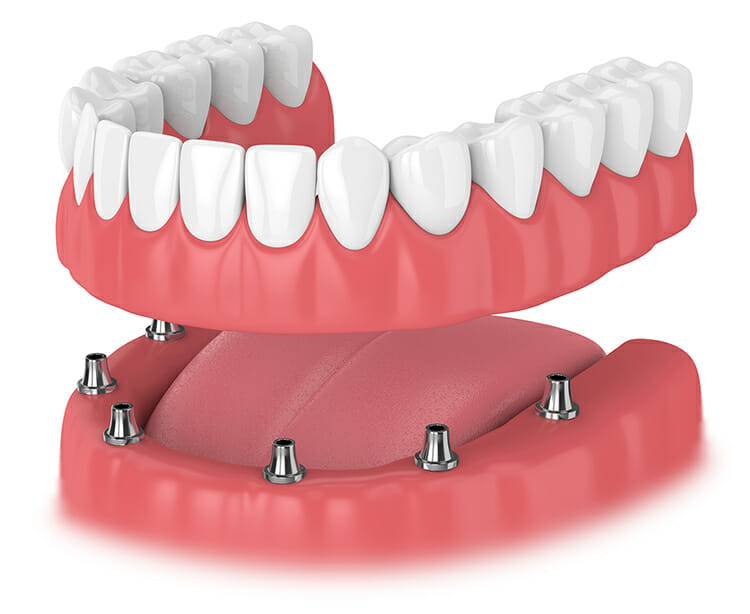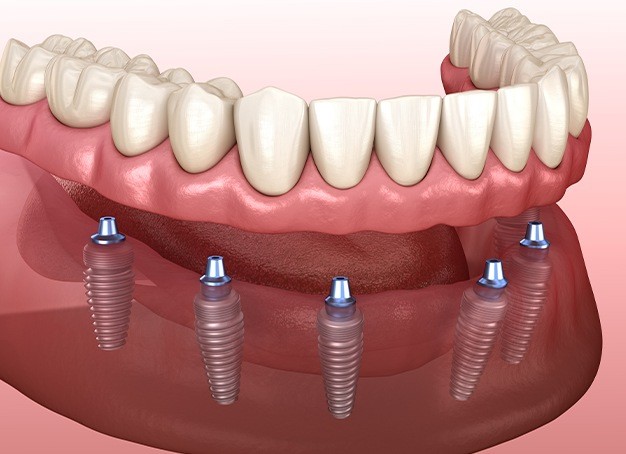
Want to replace missing teeth? Implants and Dentures are the best options.
Have you lost one or more teeth due to infection or damage? Missing teeth can have a big impact on your life in many ways. Gaps between your teeth can affect the way you chew and eat, leading to nutritional and digestive problems. Without teeth to support the jaw structure, your facial features begin to look old and distorted, with sunken cheeks and wrinkles around the mouth.
No matter the reason for your missing or damaged teeth, you deserve a solution that looks natural. When you need to replace one or more missing teeth, you have a few options, including implants and dentures.
What are Implants and Dentures differences and what are they used for?
Dentures:
A denture is an artificial device that is supported by the soft and hard tissues surrounding the space left by your missing teeth. Dentures are removable, artificial teeth that can be fitted to your mouth regardless of how much bone is left.
Two types of dentures are available:
- Complete Dentures – Used when all (or most) of your teeth are missing, they can be a complete set to replace all teeth in the upper or lower jaws.
- Partial Dentures – Used when you still have some healthy natural teeth left, can be made to replace a few missing teeth.

Additionally, while traditional dentures can be removed, there is also a hybrid option that combines the use of a dental implant to create a permanent (non-removable) solution.
Thanks to advances in technology, today’s dentures are always custom-made to fit your mouth and look incredibly true! Dentures are removable false teeth that replace areas with missing teeth.
Procedure for Dentures:
Implants:
Dental implants are another great solution to replace missing teeth. With this solution, a dental implant is surgically placed in your jawbone, just like your natural tooth root. Once the implant has had time to heal, it will be moved up with the restoration.
Dental implants do an excellent job of restoring your smile to its beautiful and natural appearance. Implants replace the tooth root with a screw-like device that is placed in the jawbone. On top of the implant, the dentist will place a crown to mimic the shape of a real tooth. Implants require enough bone to hold the screw-like implants that are secured to the crown.
Procedure for Implants:

A dental implant is created by first removing the damaged root. Once the root is removed, or if the root has been removed previously, a hole is made in the jawbone. A metal artificial root, called a post, is inserted deep into the bone. A crown will be placed over the top of the post, but not until the bone has begun to grow around the post and secure it in place. It can take a few months until the post is ready to receive the abutment, the piece on which the crown will be placed. Sometimes an abutment is placed when the post is placed. The final step is to have a crown, which is an artificial tooth made to match the surrounding teeth attached to it.
What are the benefits of dentures over implants?
Implants and dentures each have their advantages and disadvantages, so it’s important to discuss your options in detail with your dentist. However, there are also important differences between the two dental solutions. Here are some pros and cons of each approach that you should consider before making a decision.
Pros and cons of implants and dentures:
Pros of dentures:
- Dentures have come a long way since their innovation. Modern dentists can match the colour of your gums and help you choose a tooth colour that looks natural.
- Unlike implants, dentures do not require any surgery. Impressions are taken from your mouth. Missing teeth can make your face appear to droop inward, but dentures support your cheeks and lips and restore some facial structure. Moreover, partial dentures are easy to adjust if you lose more teeth.
- One of the main appeals of dental implants is cost. Getting implants for multiple missing teeth adds up quickly. Dentures are usually the best option if you only have a few teeth left.
- Also, insurance policies usually cover dentures. They generally do not cover implants because they are considered a cosmetic procedures.
Cons of dentures:
- Dentures take a long time to get used to. At first, you may find it difficult to eat and talk as you normally would. Also, because teeth can be removed, they are at risk of moving around or falling out. It can be both painful and embarrassing for the wearer.
- Certain dietary restrictions, such as avoiding hard and chewy foods, may reduce the chance of tooth loss, but these restrictions are painful and can prevent you from eating a balanced diet. Even when following boundaries, food can get stuck under the teeth. It takes about 30 days to get used to eating with dentures.
- One way to keep teeth in place is to use specially formulated adhesives, but some people find the taste and texture of these products unpleasant.
- Another drawback is dental care. They should be removed and cleaned before sleeping at night. Also, they are not permanent. With proper care, they last an average of six years before requiring replacement.
- People with dentures need to be extremely careful, as they are fragile and can break if dropped or misused.

Pros of implants:
- Dentures cannot compete with the look of implants. Implants are placed into your natural gums. They look and function like real teeth. They are a permanent solution and do not require replacement like dentures.
- One of the simplest benefits of implants is that you can brush and care for them just like your natural teeth. In addition, there are no dietary restrictions.
- Implants preserve bone structure. The implant replaces the root of the tooth, and the jawbone forms a bond with the implant as if it were a real tooth.
- People with missing teeth that are not replaced with implants often suffer from changes in facial structure.
Cons of implants:
- Implants look and feel like natural teeth, but not without cost. It is an expensive treatment that is more practical to replace only one or a few missing teeth.
- Another factor that can turn people away from implants is the fear of oral surgery.
- Implants are an invasive procedure, and the whole process can take up to nine months with several appointments.
What are Implant-supported dentures?
Implant-supported dentures are also known as fixed or permanent dentures. An implant-supported denture is used when a person has no teeth in their jaw but has enough bone to support implants. Implant-supported dentures are an alternative dental solution for patients who have lost their upper or lower teeth. Implant-supported dentures are the love children of dentures and dental implants. They use dental implants to support the force of your bite. These devices combine these two advanced artificial devices.
Implants have special attachments that are attached to the teeth. These attachments can even be retrofitted into an existing denture to make it more stable. With continued use of dentures, the underlying bone changes and the teeth gradually lose their fitness. Eventually, there may be so much bone loss that a well-fitting full denture can no longer be made. Because of possible bone loss and better comfort, implant-supported dentures are a good way to replace missing teeth or replace traditional teeth that no longer fit.

This is a huge difference between dentures supported by implants and traditional dentures. Unlike traditional dentures that rest on top of your gums, implant-supported dentures are anchored to your jawbone so they don’t slip. They stay firmly in place and allow you to eat foods that traditional dentures wouldn’t. While traditional dentures rest on the gums and can be attached to natural teeth, implant-supported dentures are dentures that are held in place by implants.
Patients now have the option of anchoring teeth to dental implants, which significantly improves chewing function and creates a natural appearance. However, not all patients can receive an implant-supported denture for several reasons, including gum tissue volume, jaw density, and health concerns.
Procedure:
During the installation of these dentures, an oral surgeon will surgically attach four to six implants, usually titanium screws, to the patient’s jawbone. Once the implants are firmly attached to the patient’s jawbone, a unique set of teeth is attached to them. Once fitted, these dentures cannot be removed without the help of a dentist. The patch is then given time to properly fuse with the patient’s jawbone tissue. This process usually takes three to six months. This procedure is known as osseointegration.
What are Implant retained dentures?

The benefit of these implants and dentures is that they don’t move out when you talk or eat and provide some improvement in bite force, but they don’t fully mimic your natural bite. Implant-retained dentures can make loose teeth extremely secure.
If you are expecting to eat most things with implant-retained dentures you can, but some things are unrealistic, like cutting an apple directly. If you apply too much pressure on the front teeth, the teeth can be displaced. Implant-retained dentures provide more support than traditional dentures, but your patient is more likely to develop scarring.
Procedure:
An implant consists of a titanium post that is surgically embedded in the jawbone and then left to heal for a few months to allow the surrounding bone and gum tissue to bond with it. Does this create a secure and stable platform that can then support the false tooth or dentures? They are the closest thing to natural teeth because they replace the entire tooth structure, including the root, and thus feel, function and look just like the real deal.
Implant retained vs. Implant-supported dentures:
Both types of dentures can provide excellent cosmetic and functional results, so choosing the right type of implant dentistry for you depends on a few relevant factors such as health, lifestyle, dietary choices, and cost can determine how each fits into your lifestyle.
Health
Sleep apnea patients will generally feel more comfortable being able to wear their dentures at night and can benefit from strong, well-fitting dentures. In this case, an implant-supported denture may be a better solution, especially when stronger materials are used for the restoration.
Lifestyle
Some patients hate the idea of having removable implants and dentures, because of the constant reminder of their teeth falling out, and prefer to wake up with dentures that are permanently in place, until they have them removed by a dentist. For these patients, the psychological benefits of implant-supported dentures can be significant.
Diet
A patient who does not mind avoiding chewy foods will probably be comfortable with implant-retained dentures, especially if they have already spent years on soft, easy-to-eat foods. If a patient who prefers to eat chewier foods chooses an implant-retained denture, they should be fully informed of how this will affect their food choices.
Cost
An important factor to keep in mind is payment plans that offer patients little to no interest. In general, the fewer implants you need, the lower the overall cost. However, it comes with less stability in teeth. Implant-supported dentures are more expensive but can be considered to provide more benefits.
What do the implants and dentures cost?
The actual dental implant dentures cost depends on one’s circumstances and insurance coverage. The average price of the procedure is $6,000. Regardless of these upfront costs, these removable denture implants still fit as a suitable solution for those in need of teeth replacement. The average dental implants and dentures cost will be around $6,000 for the entire procedure. There are many affordable dentures and implants prices also available to relieve your discomfort and improve your smile. A complete set of affordable full dentures and implants costs anywhere between $600 to $1000. Implant-retained dentures cost between €3,295 and €6,490 per turn depending on the number of implants required With modern dentistry, various patients may be good candidates for implant-supported dentures or full-mouth dental implants. This type of dental implant-supported dentures, cost can vary from $7,000 to $90,000. The average cost for full mouth implants is almost $34,000. A lower denture implants cost or dental implants upper dentures cost lies between $3,500 to $30,000.
FAQ
How do implants work with dentures?
Dentures and dental implants are also called implant-retained dentures. Thus, they use the protection of dental implants to hold your teeth in place. Implants and dentures can work together to provide the most effective and permanent solution to tooth loss. Implant-retained dentures are often used for the lower jaw, where traditional dentures are unstable. However, you can still get permanent implant dentures in the upper jaw.
Can you replace dentures with implants?
Many dentists advise patients to replace their teeth with dental implants to enjoy comfort, better function and other benefits. Dentures can be replaced with dental implants to provide a more stable solution for patients who have lost most of their teeth. The procedure involves placing two to six implants on each half of the patient’s jaw where the dentures are placed.
How many implants are needed for full mouth?
If you are missing all of your natural teeth, full-mouth dental implants or full upper and lower denture implants are a viable option. Many people call these full mouth implants “all-on-4” or “all-on-6.” All-on-4 means that a complete dental arch can be stabilized on at least four dental implants or “all-on-four” dental implants. All-on-6 means that a complete dental arch can be stabilized on at least six dental implants or “all-on-six” dental implants.
What are the different types of dental implants and dentures?
You can choose three general types of dental implants: endosteal, subperiosteal, and zygomatic.
- Endosteal: These are placeholder posts that are shaped like screws. They are inserted into the jaw on which the false teeth are placed.
- Subperiosteal: Instead of implanted into the jawbone, subperiosteal implants sit above the bone but still below the gums.
- Zygomatic: The implant is placed in the patient’s cheekbone rather than the jawbone.
There are mainly two types of dentures: Traditional complete dentures and partial dentures.
- Complete dentures are suitable for people who have lost all their teeth and traditional dentures replace their teeth in the mouth.
- Partial dentures are used when a patient has some natural teeth left in the mouse like some molar teeth in the upper jaw and some molar teeth in the lower jaw
How painful are implants for dentures?
The dental implants and dentures surgery itself should not involve any pain as the mouth will be numb. As the numbness wears off, however, patients will often experience some level of pain. In general, a single implant will cause less discomfort than surgery where multiple implants are placed. The pain that patients experience during dental implant surgery is not actually from the hole made in the bone or the placement of the implant but the pain is usually from the soft tissue operation that occurs during the procedure.








